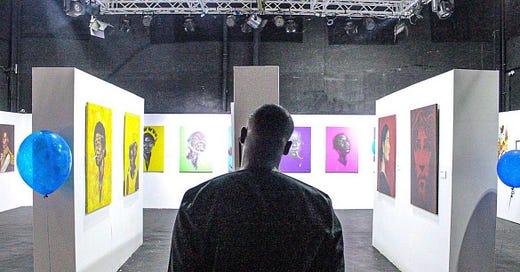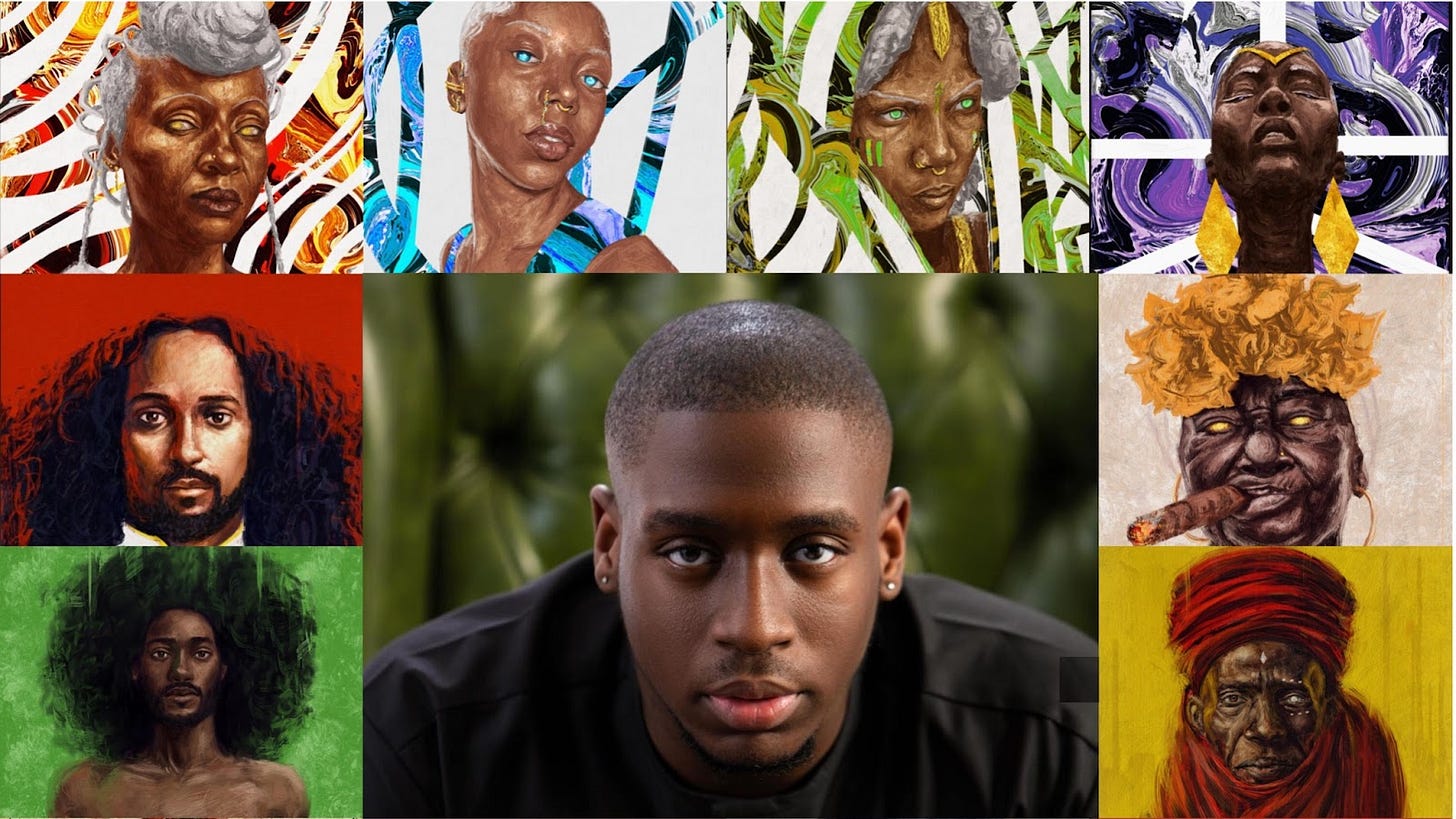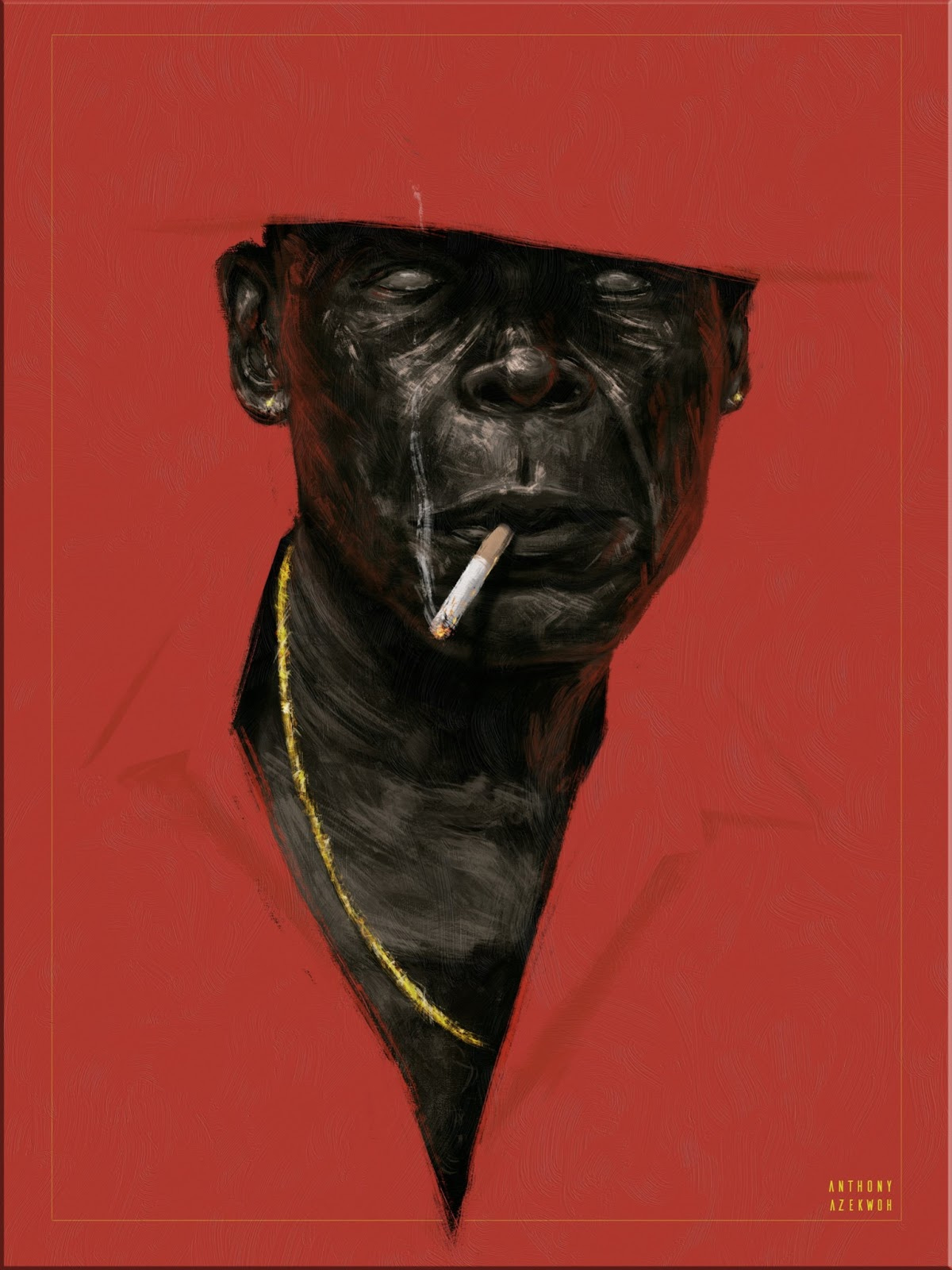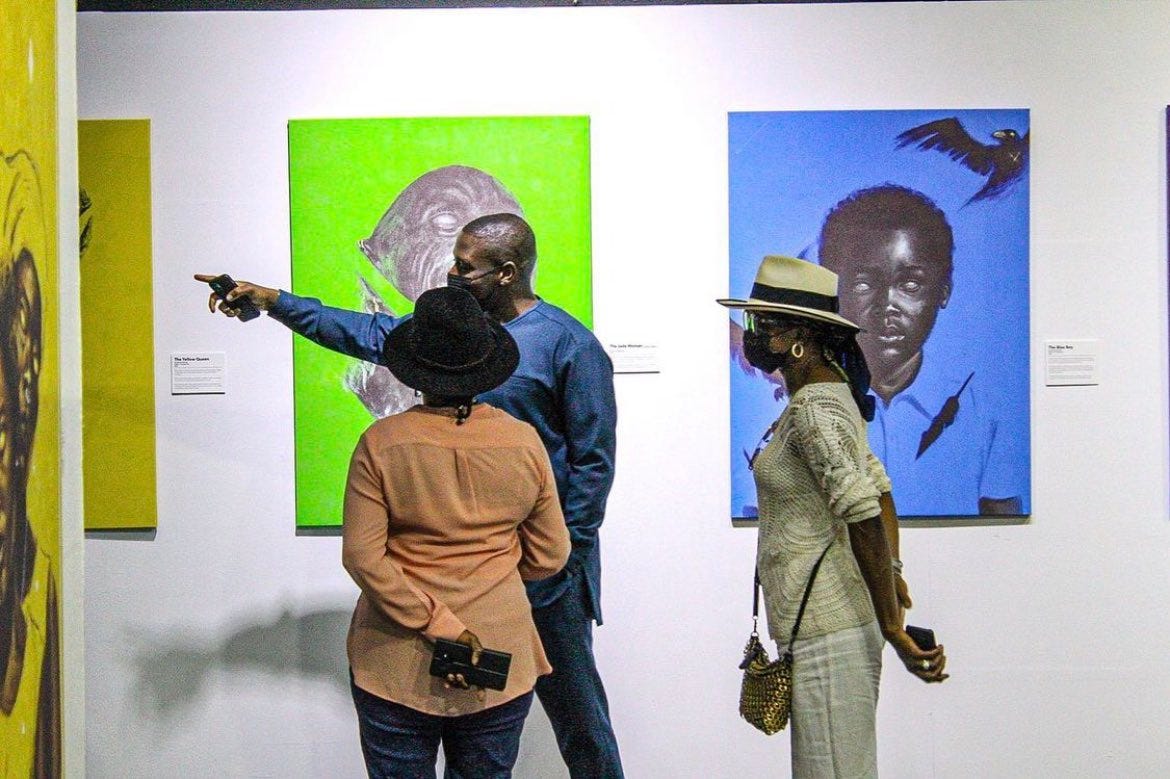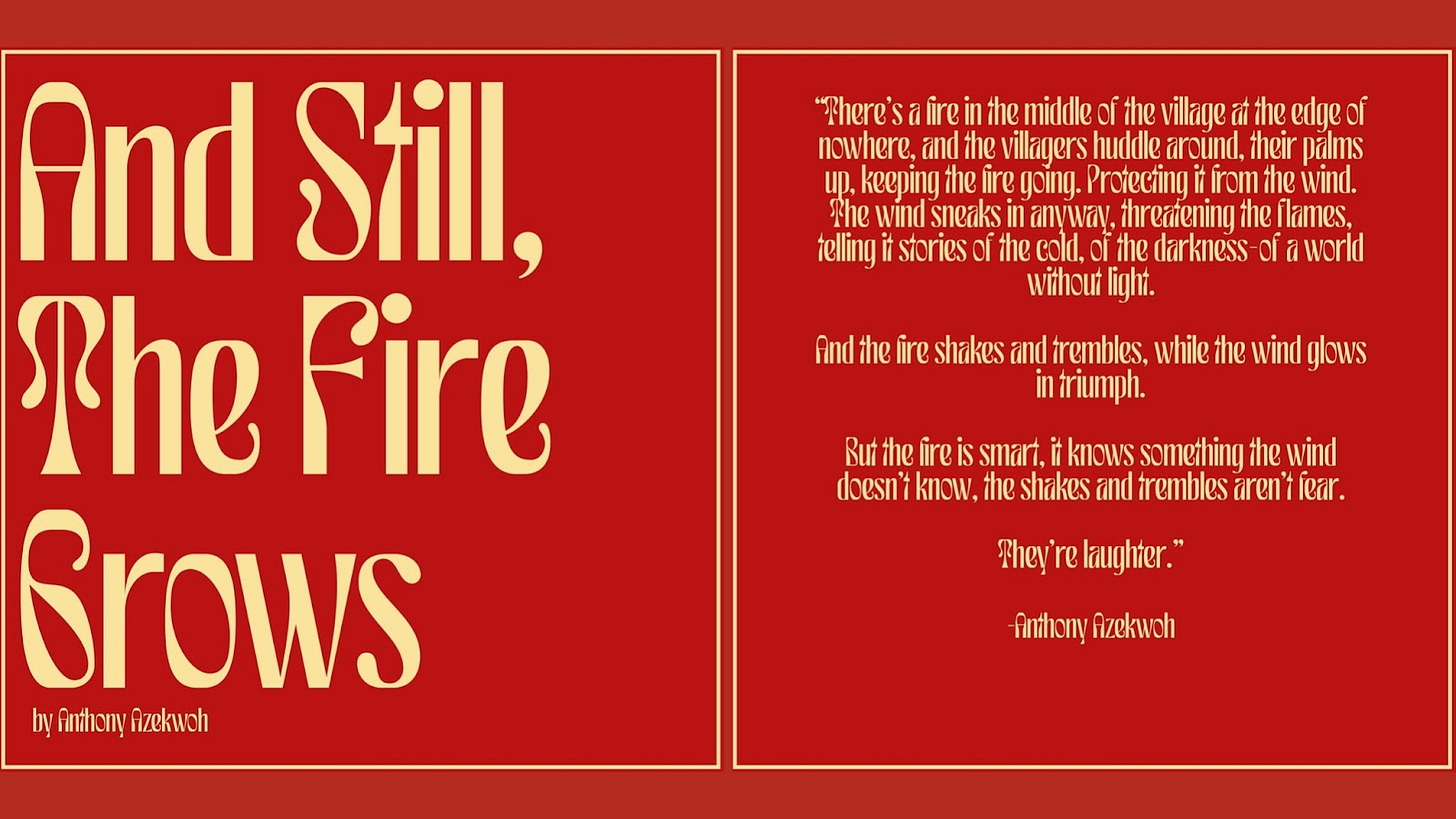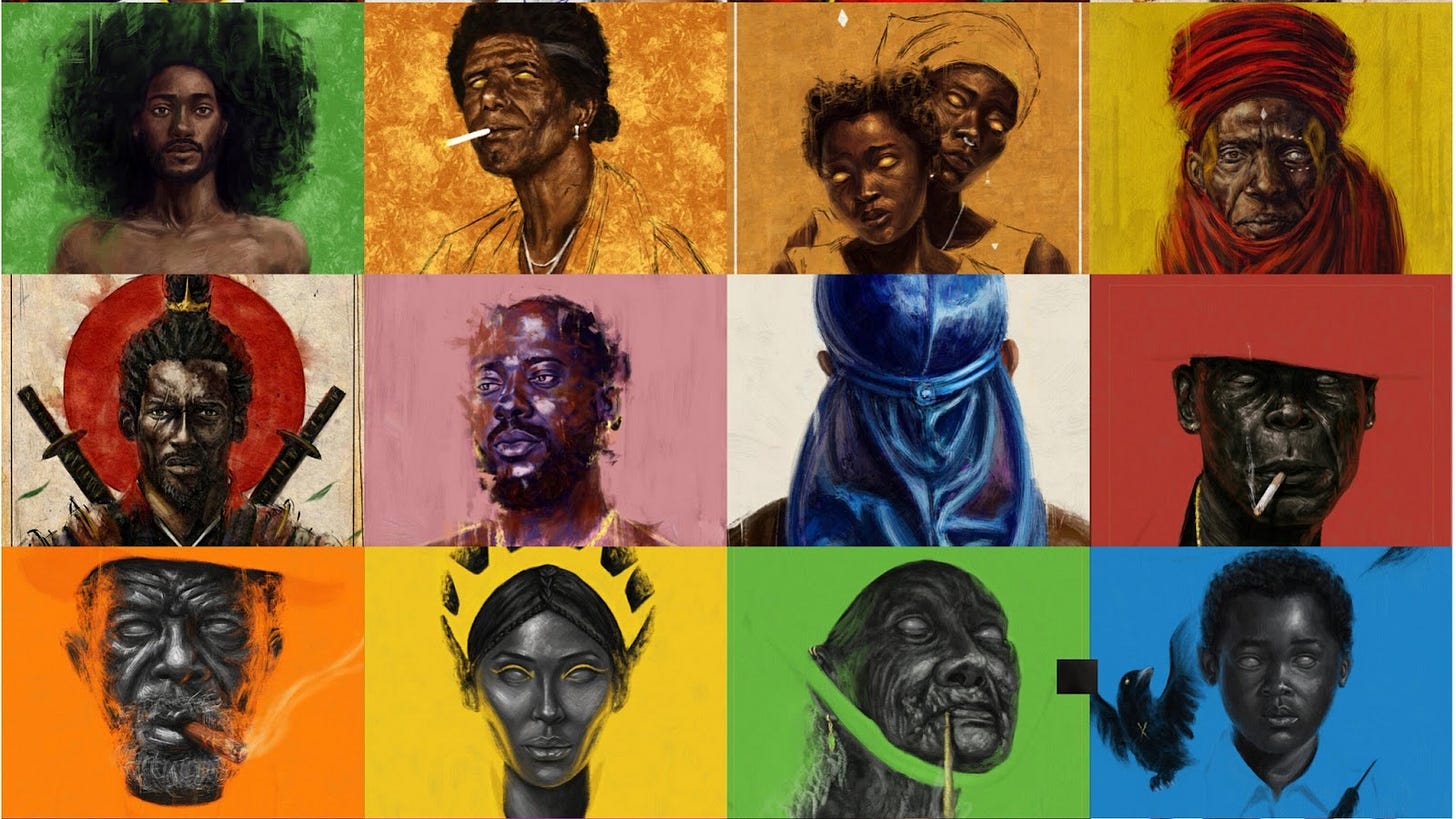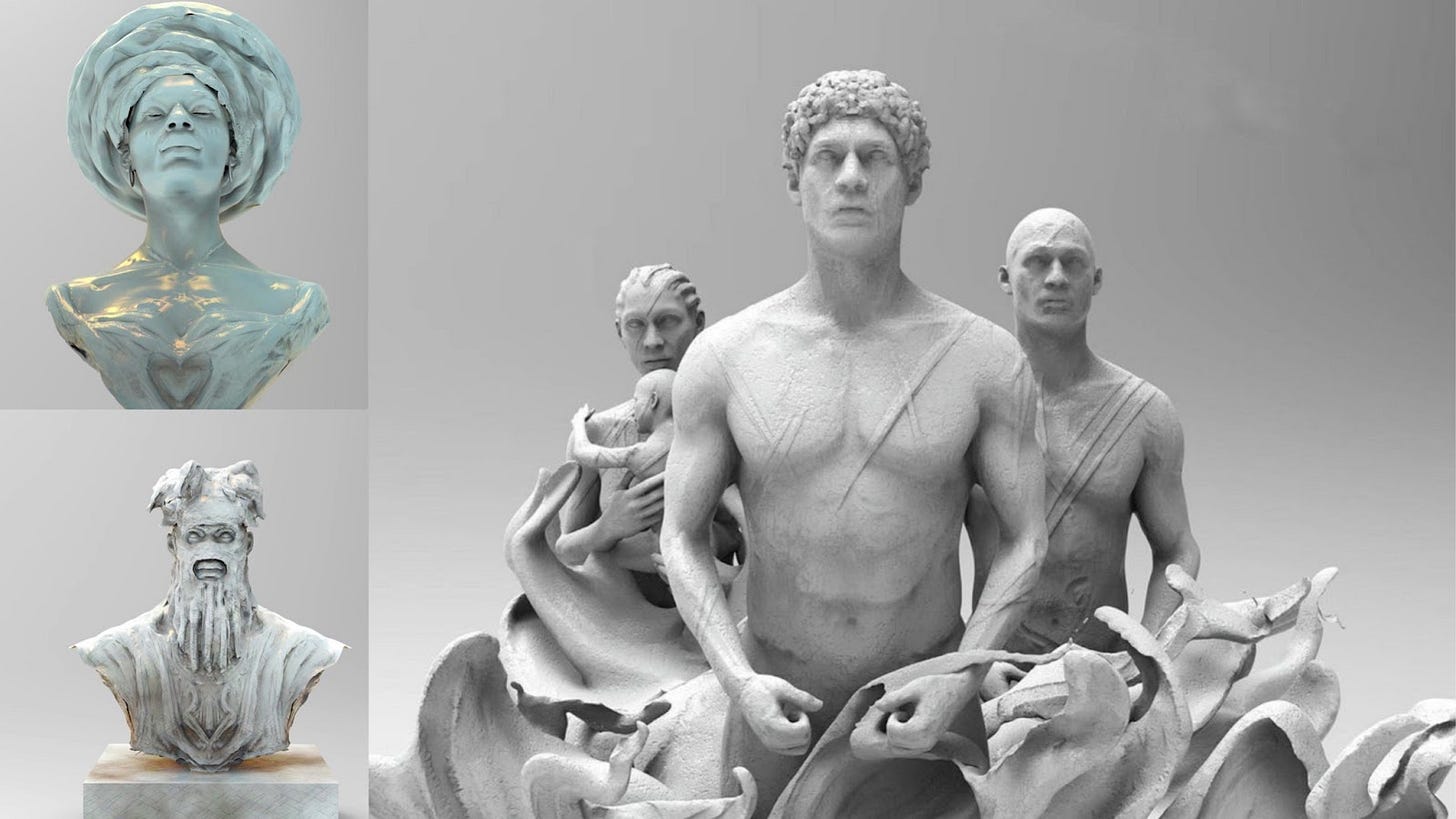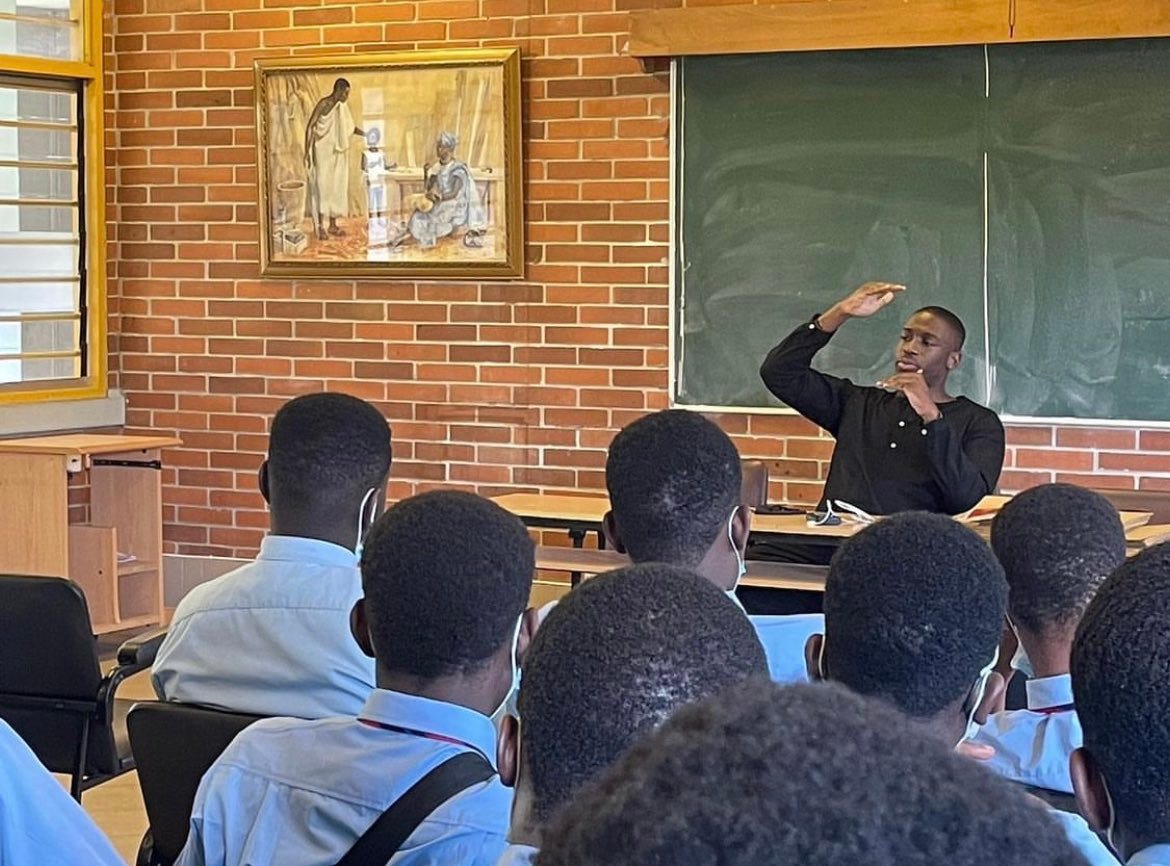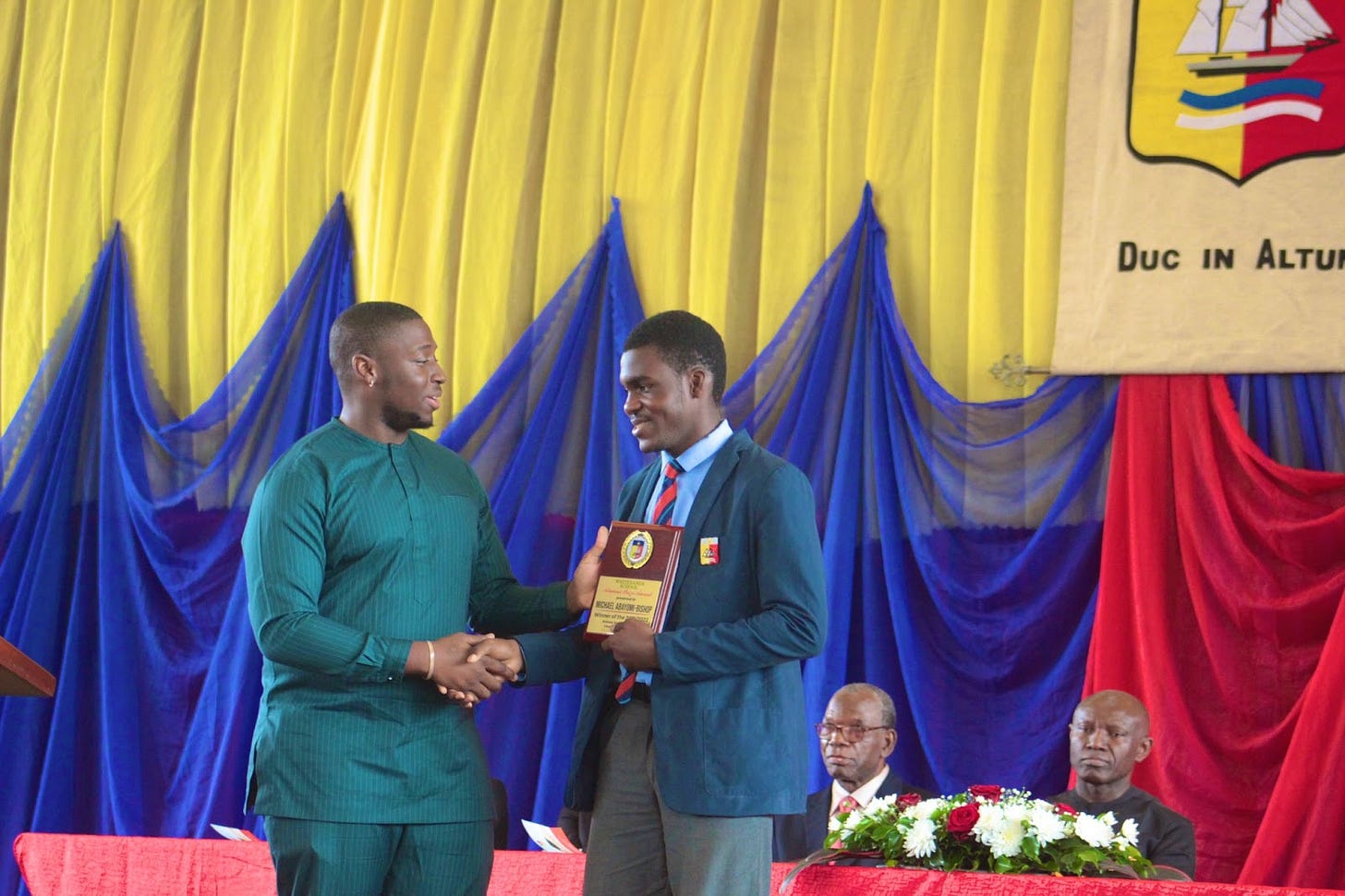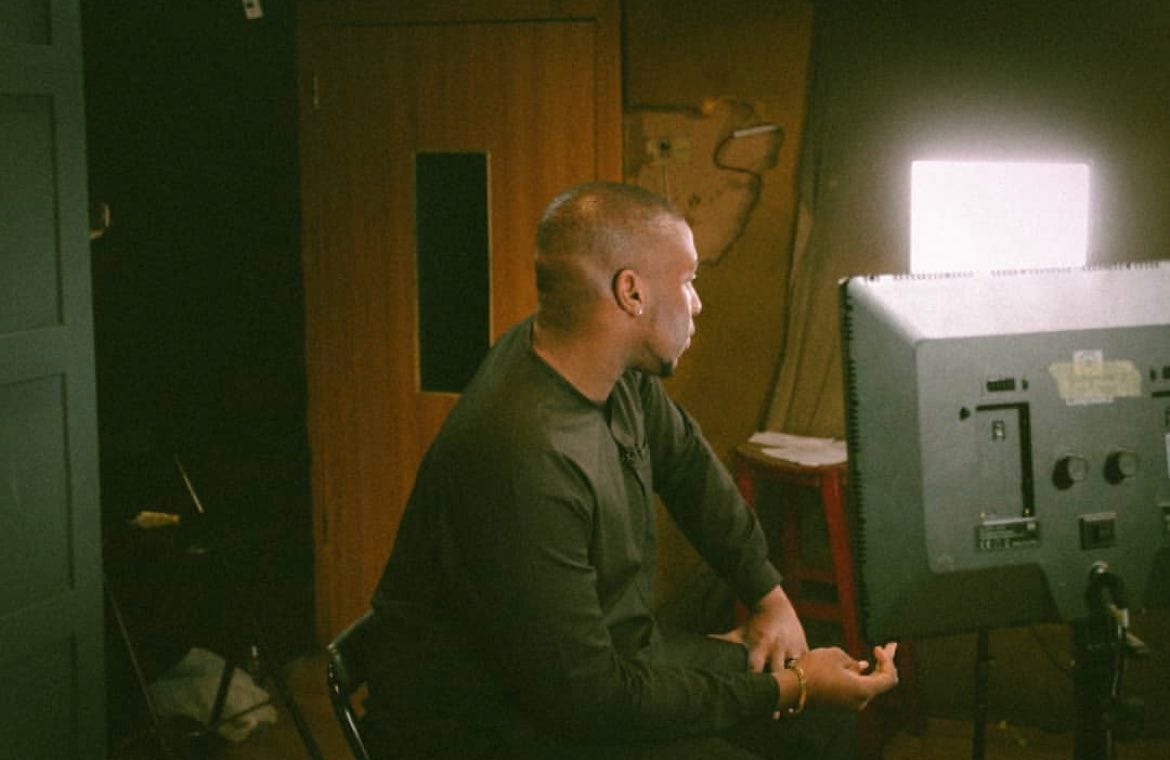Beyond the art: What African artists can learn from Anthony Azekwoh
At 22, Anthony Azekwoh is one of Nigeria’s most remarkable digital art creators, and his journey to success is even more astounding.
Anthony Azekwoh started as a writer at the early age of 13, and he drew inspiration from Kola Tubosun, his English teacher at Whitesands secondary school in Lagos, southwest Nigeria. As with all schools, students were ranked based on their performance in different classes and subjects.
Anthony had been a junior student who was fascinated by the discoveries in science and finding out new things—but not science in itself. “I’d just entered senior school, and I hated each science subject even though I was good at science as a junior. I wasn’t really failing. I was average; just vibing.”
To Anthony, Tubosun, who was also a writer, didn’t look like the archetypal struggling writer. “Seeing him alone opened a whole new door in my head…maybe there’s something here: another path. He used to give us these funny assignments, like we should do some research and open a blog. At the time, the biggest writing platforms were Wattpad and WordPress, which were still new.
Though he was in science class, he enjoyed reading. So, he would follow literature students on trips. He struggled to find his identity, and writing seemed like a good way to explore it. “I started experimenting with WordPress.” He’d write, share on Twitter, and beg people to read his work. Over time, his followers knew him as ‘Anthony, that guy who writes poetry’. “Though I wasn’t writing poetry, I ran with it.”
Wattpad had a small community of Nigerian readers; it was a cool place to learn. Though experimental, it changed his mindset and taught him everything from writing books to putting up a cover. Wattpad also taught him discipline because “Wattpad readers don’t care if you have exams.”
That was nine years ago.
Though nine years seems like a long time to be writing, Anthony considers it fleeting when compared with people who have been engaged in the craft for 20-30 years. He, however, agrees that, at the end of the day, the most important thing is not the time spent doing something, but rather the quality of the years.
On the one hand, with five books under his belt, Anthony still doesn’t believe he’s been able to hack the art. On the other hand, his visual art—digital art, paintings and sculptures—takes him on a different road to fame.
The turning point
“For paintings, my turning point came before I even knew what Web3 and NFTs were, and it came with The Red Man.”
In 2020, Anthony shared a painting called “The Commander” that had taken him 12 hours spread across a week to create. “My blood and tears were in that painting, and I was thinking that by the time I posted it, omo people will hear my name. But that’s not what happened.”
It didn’t garner the attention he felt it deserved based on the effort he’d invested into the painting. That left him feeling very demoralised because no one seemed to care about it.
The following week, he posted “The Red Man” with little expectations. It went viral immediately. What started out as a practice run and a routine weekly post for him forced Anthony into the business of art.
Though becoming famous was something he wanted, he wasn’t prepared for the attention the painting received and the business behind the art. “It was an overwhelming moment for me because I was no longer just an artist; there were a lot of things involved in the business, like logistics and shipping.”
While his turning point came from that moment and Web3, he insists his success was an effect of the reputation he’d built over the years from his good work. “I think that's why people gravitated towards it because good work is good work whether it's NFTs or whatever.”
Getting into art
Anthony’s first digital drawing is framed and sits on a wall in his Lagos home. It’s a drawing of an elephant he did on Adobe Illustrator.
In December 2016, Anthony’s laptop broke down. “My handwriting is horrible, so I don’t do longhand. But I picked up a piece of A4 paper to draw.”
At the time, drawing wasn’t fun for him because art materials were expensive. He’d just started his first semester in Covenant University, where he was studying Chemical Engineering. “My parents weren't fully in support of my love for art. They didn't understand it. They were like, ‘Your hobby is nice and all, but it’s better to focus on what we sent you to study in school.’”
But his love for art only grew stronger.
Facing crises
After Anthony’s work started gaining visibility, the shift was drastic. He went from asking others to share his work to being a viral sensation for his paintings. People wanted more. “They were saying, ‘where's the red woman, the red wife,’ and whatnot.”
In 2021, he was hospitalised because of what his doctors could only say was psychological. “Nobody could figure out what the issue was. It was just back-to-back fainting and collapsing,” he said. The weight of everything, from art to his final exams at school was too much for him to bear, especially for a 21-year-old still navigating the throes of life.
He faced pressure from his work, school, the environment, and his parents’ expectations. All the stress that had accumulated over the years hit him at the same time. “I was like I couldn't do this anymore, and it didn't make sense. I was fighting a lot, from health issues to mental issues. I wanted to change my life.”
Luck was on his side. “Coincidentally, my NFTs started gaining traction, and for the first time, I had a choice.” He didn’t have to keep suffering through school, studying a course he had no interest in. So, after his third exam paper, he packed his things and left school.
“There are some things you always have to cope with,” he says. For him, it was leaving school. But in the end, everything turned out well for him.
Finding a way out of the dark
Healing and recovery aren’t always straightforward processes for some people. And a lot of the time, it demands them to make sacrifices for their wellbeing.
Anthony had to learn to set boundaries and be very ruthless about his mental and physical space. “I realised that I was spread too thin by trying to please everybody. To be the perfect person, the perfect son, the partner, the perfect friend. But you can’t please everyone.” It didn’t make sense for him to be suffering in that way.
The problem continued after he left Covenant University for Lagos. The son of a no-nonsense father, he had to choose between school or leaving his parents’ house. Furthermore, nobody expected him to leave or stay away for long, assuming he ran out of money soon.
It was an easy choice for him, though it came with challenges. “They didn't realise that I’d planned out my career. From September to December, we were doing exhibitions. I had to leave my parents' house and live in hotels. There was family drama, personal drama, all while I had to run the exhibitions and art shows.”
Azekwoh recognises that although he was going through a hard time, it was also difficult for his family to watch him dive head first into an uncertain, volatile career. “You know, Nigerian parents have kind of projected what your future should look like, and now you’ve deviated to something like painting. I put myself in their shoes and saw that if it were me, my head would be hot. So, I approached their point of view with empathy.”
Though Anthony no longer lives with his parents, they are on good terms. “As time moved on, we all just understood each other more. My dad was worried about my future, and I tried to let him know how much I believed in it.” Now, when his team is recording documentaries, his father lets him use his office, and his mom provides food for the whole crew.
He’s still trying to navigate being an artist, paying bills and salaries, and just being a young person trying to make it in life. “For me, it has always been a matter of overcoming things. No matter what I'm going through, we'll run it.”
One thing many creatives face is the pressure to create, regardless of whatever issues they may be facing in their personal lives. Anthony confirms this: “Nobody wants to hear about your personal wahala. Everybody wants to see the products. Nobody cares about what you're going through; they just want your painting.”
He’s gone through so much since then, from facing backlash over perceived copyright to losing someone. But he’s learned to handle everything life throws at him.
Stolen or derivative?
In July 2022, two weeks after Anthony lost his friend, an artist he’d met at Covenant accused him of ripping off his work. It was a sculpture he’d shared on social media that looked similar to the other artist’s painting. “The issue was I had him muted before that, and so I didn’t see his post. I mute people because I just don’t want to see certain things.”
The artist accused Azekwoh of stealing the concept of his work. “It was weird because he could have texted me about it but he tweeted that I stole his work and put out my name in full. I think he’d been building it in his mind, but that was his limit. Others online started coming for me. ”
Following the backlash, Anthony put out a general statement explaining that the similarities between the two works were only in the angles and they were both women in gele. For years, a lot of artists have captured women in the cultural gele, so he believed some of these works might appear similar even though the artists never saw one another’s works.
Anthony and his team had previously been splitting profits with artists or photographers from whose work he’d drawn inspiration. “We’ve shared a lot of money, and if it's directly derivative, we split the profits because it’s a collaborative effort.”
The Red Man, for instance, was a derivative, and Anthony boldly stated years ago that it was derived from a photo and he’d contacted the photographer. So, he felt hurt by this situation and the ensuing discourse. It could, after all, have been resolved with a phone call. Though multiple people eventually called him to apologise about what they’d said, there was already a stain on his name.
The business of art
When Anthony became more serious with the business of his art, branding and documentation were key to his success. Coming from a writing and storytelling background, he understood how stories shape the way a thing is perceived.
“I don’t like tweeting, doing promo runs, and radio runs. It’s hard for me because there’s a lot of stuff you have to do repeatedly and stuff you have to put out. But we needed to do it.
“Social media is just one avenue; becuase what happens when the algorithm fucks with you? That’s what happens a lot when CEOs change the way their social platforms work.” That’s why it’s important that Anthony’s identity supersedes the platform he showcases his work.
“My goal is that, 10 years from now, when kids say to their parents that they want to become an artist they’d immediately agree and would be like ‘yeah, you want to be like Anthony Azekwoh?’ and be happy to say it.”
With this big picture in mind, he’s striving to create a path for himself in the industry, taking speaking gigs and interviews even when he doesn’t like them.
“I still feel like my identity involves telling stories and presenting things in a certain way, and art is just one of those ways.”
From this realisation, he’s had to embrace his growth. Along the way, they made a lot of mistakes and handled a lot of processes to date. “Financial management is what I am still struggling with, the people I keep around me, and impatience. Sometimes, you’d want something by tomorrow, but it takes longer to get it done.”
Embracing Web3
Despite Web3 presenting a platform for Nigerian creatives to cultivate a new and wider range of audiences, Anthony insists such audiences can only be truly sustained if the creators innovate and scale up.
“With Nigerian artists, I think what’s happening now is an unfortunate correction where Web3 was branded as this saviour. The problem though is that there are a lot of actors you have to keep in mind. When someone gives you money or buys your work, it is due to the work and also your brand,” he said.
“People will be looking at what you’re doing with it and what you’re building because they believe in it. What now happens is you take that money and now you’re rich. But your work hasn’t evolved and you haven’t improved your brand. You’re still at a similar point and churning out similar work. There’s no evolution, which I would say the money should help.”
Knowing stagnation will affect how he is perceived by some of his peers and art collectors, Anthony embraced new challenges - 3D painting and sculpting.
“It’s dangerous to stay in one thing and be stagnant, especially in this changing ecosystem. You have to evolve. People are expecting growth, change, evolution, and value from you as an artist.”
For him, Web3 isn’t the be-all in the new creative frenzy. Innate talent and the ability to keep it fresh and exciting are very important for any artist to get wider appreciation.
“The NFT community was once homogenous, making it easier for everyone to dabble in the space. Now, it’s shifted its zones. Mostly those with big clout who have built stuff over the years can win. That’s how the normal world works, but I feel it doesn’t favour new artists.”
“The biggest mistake for me when I was starting was thinking it would be different for me. But though things are easier for me now, it’s only different for those who have made a name for themselves or who are in a strategic geographical location.”
“When you are Nigerian or African, you are away from that world stage, and I feel like you have to be in certain geographical locations to be a part of it. As Africans and Nigerians, our realities are always different, and we have to fight harder to get to those points.
There’s hope, though, for young artists. “For me, it’s the evolution of your work, your brand and also understanding the situation, the economic realities of these platforms, and the people involved.”
The Rosemary Fund’s helping hand
After Anthony sold out his first collection in 2020, he felt very uncomfortable. He had more money than he needed, and that made him uneasy. Remembering how difficult it was for him to break even initially as a creator, Anthony is devoting his time and finances to giving new artists an easier path to making a name for themselves.
“I felt it was too much money because I wasn’t doing anything. I’m not someone who hoards wealth and knowledge. I was fine. I was like, look, someone maybe needs like 1% of this until I start.”
“That is why I try as much as possible to help artists. I know that I am doing good. What if I am not able to provide for the rest of the community? Then I have failed, and it's not something I'm cool with. It is something I make a point to do all the time.”
Returning to where his journey began, he has also set up the Anthony Azekwoh Prize for Art at his alma mater, Whitesands. Now, he helps artists by asking them what they need and how his The Rosemary Fund can help.
The future
Anthony tells us to expect cool stuff from his team. “We’re trying to make a formal structure for Nigerian artists, how we’re going to replicate other systems. How can we help other artists get the support they need? Do we have independent gallery shows here and there?
The next thing is my new Witches of Auchi story that I have been working on. It’s coming out soon, and we’re starting with how we can bring it out.
“We have a big showcase coming in December. We also have a documentary coming; we can't talk about it now because of contracts, but I’m excited.”
“Honestly—and this is the first time I’m saying it in an interview—I feel like my role is also shifting and in the next couple of years, I would not be making art in this same way. I feel like I’m heading for more.”
You can follow Anthony on Instagram and Twitter, or browse through his official website.

